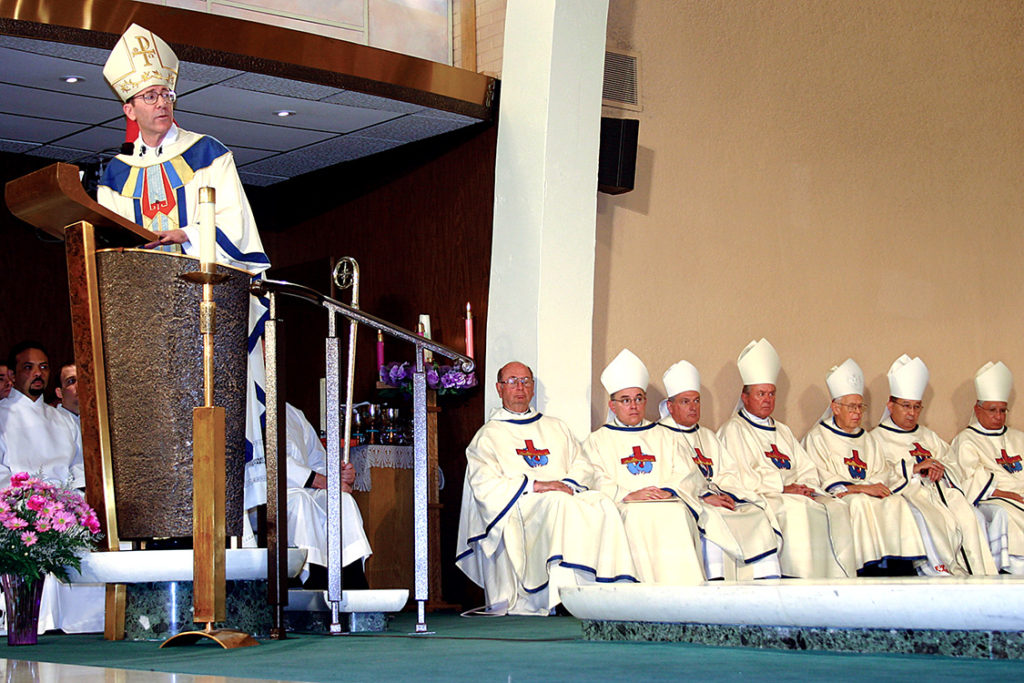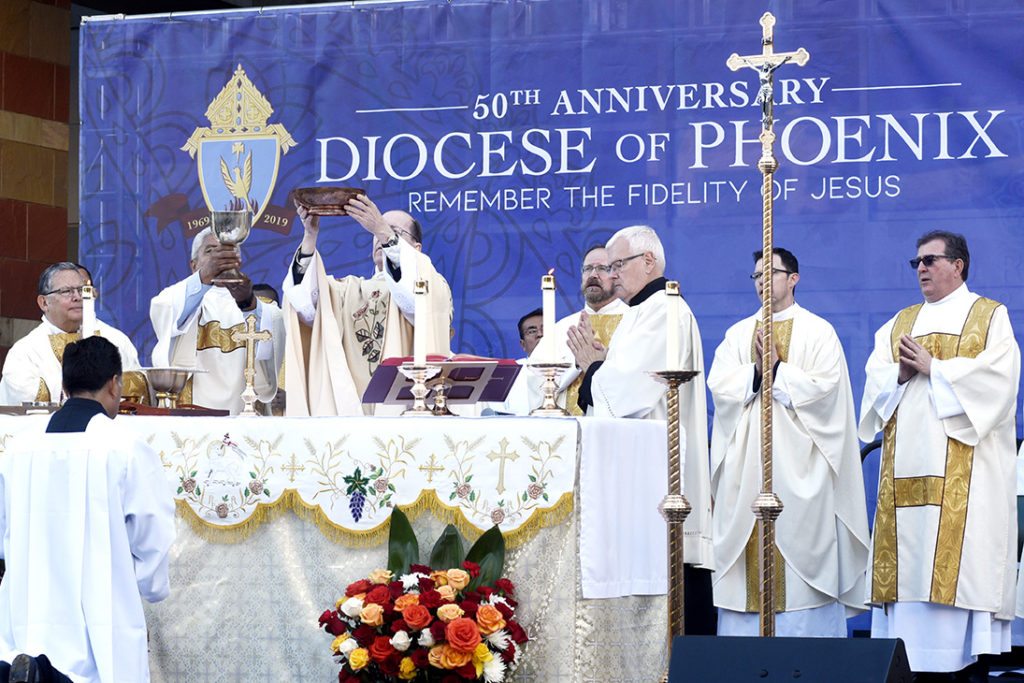
Editor’s note: To mark the 50th anniversary of the Diocese of Phoenix, Bishop Olmsted sat down with Michael Dixon for an interview on “The Bishop’s Hour,” reflecting on the past, present and future of the Church in Arizona. (cue 4:02 mark) The conversation has been condensed and edited.
Bishop Olmsted’s series on Transcendentals returns in the December 2019 issue of The Catholic Sun.
Michael Dixon: What does the 50th Anniversary of the Diocese of Phoenix mean to you?
Bishop Olmsted: It is a significant period of time when you look at Church history. So much has happened in the last 50 years in the wake of the Second Vatican Council. It’s been a time of the Holy Spirit moving us beyond what we thought before in terms of using new media for evangelization.
You’ve been here 16 years, more than 20 percent of the history of the Diocese of Phoenix. Could you do a little comparing and contrasting for us between what you saw when you got here and where we are today? Is it what you expected?

Well, it was one of the very few dioceses where I didn’t know any priests, deacons, religious or lay leaders before I arrived, so that was kind of unusual for me. Now I feel very much like the spiritual father, and I feel so close to this family. On a very personal level, I’m deeply moved by being here. In the beginning, I just was not sure what the Lord had in mind for me. But I remember very clearly the first words of Bishop (Thomas J.) O’Brien. It was a difficult time in his own life, but he said to me, “You are coming to a wonderful diocese.” And he was right, it is a wonderful diocese.
The thing that impresses me is this diocese is so vibrant. The whole Southwest is growing, and that presents both joy and challenges. Are we prepared to embrace the new people who come in?
I don’t suppose we could ever be fully prepared. We can’t presume we know who the people are coming in, even if we know what country they’re coming from or language they speak. I think it’s healthy that we learn from them; they are bringing gifts themselves that are going to be good for us as a community. We are growing very, very fast, and if the Lord asks us to live at this time in history, we trust that He gives us the grace to respond at this time in history.
Talking about growth, we have large communities from all over that have moved here. What has that brought to the diocese?
I think it’s brought us a broader sense of being Catholic. Catholic embraces every culture, every language. We are called to go out to all the world. In many ways, a lot of the world is coming to us. The one thing that unites us is Jesus Christ and the Catholic faith, and the Catholic faith moves us beyond where we are. The last words of Jesus to us were to go teach to all nations. In our case, a lot of that is to welcome those who are coming here. We go out to those who have come to us and we welcome them.
In 2017 you launched a campaign, “Together Let Us Go Forth ~ Juntos Sigamos Adelante,” a $100 million campaign for evangelization and discipleship. Tell us more about that and where we are today with it.
The primary reason for “Together Let Us Go Forth ~ Junto Sigamos Adelante” is evangelization and discipleship, because that’s who God wants us to be. And we need to really do that because we’re growing so fast. We need to be missionary disciples. It is becoming more and more important, because we find a society that is less and less Christian. So just living your faith, gladly giving thanks to God, wherever you are, to not be ashamed of your Catholic faith.
The biggest thing that we’ve seen are conversions. So many people have responded with great enthusiasm to the campaign and are generously making sacrificial gifts. We hope in that regard to be able to do some things that are badly needed, like establishing St. John Paul II Catholic High School in the far West Valley, and a new grade school in Lake Havasu. Strengthening the Newman Centers at our three university campuses. All those are feeling like they are not forgotten, that we are praying for them. There’s a whole sense of cohesiveness.
What is the greatest need of the Church today, both here and globally?
There’s a need for a sense of humility, especially with what we have had to face in the terrible scandal. When those who are ordained to serve others are actually taking advantage of others, that’s a horrible scandal. What is needed today is a real sense of humility, and asking God’s forgiveness and seeking His mercy. The Lord works well in a humble heart. It’s fertile soil for Him to work.
At the same time, we need to be courageous. It is especially at times when we looked weakest or when things seemed hopeless, like Good Friday, when the biggest explosions of grace and wonder occur. That’s true for us now. We should believe that God’s mercy means He draws closest to us. We need a spirit of humility, but also courage and praise for the mercy of God who is always present and working within us.
It’s amazing when we surrender to Him how we find He does things we never expected, and then that gives us courage to trust Him in whatever comes along next.
What gives you joy and hope?
I’m so grateful for our priests. We have some wonderful priests, and they are serving right now at a time when often they receive remarks that are very unkind and unfair to them. But they are serving with joy and conviction. I find a great gratitude on the part of our people in the parishes.
I’m extremely grateful for all of those people who are involved with marriage and family. The Diocese of Phoenix has one of the best programs for preparation for marriage. We have a wonderful Natural Family Planning program. When I see all these vibrant families in our parishes, it gives me great hope for the future.
What were the major challenges that you faced over the last 16 years? I mean, it wasn’t always a smooth ride, was it?
No, of course it wasn’t. Jesus says if you wish to meet God the Father, you must take up your cross each day and follow after Him. One of the first things I did was to really get to know the priests and to encourage them, because there was some discouragement at that time among the priests, and the deacons and their wives.
The second thing was to put into place a really strong marriage preparation program, which we are so blessed to have. There were some good things happening before, but there were ways that it needed to be strengthened in terms of really preparing couples for the challenges that were coming their way. Another major area was, of course, priestly vocations, and also men and women religious. We have been blessed that so many communities have come to our diocese in these 16 years.
It’s been a real blessing for the Diocese of Phoenix. I don’t know if people are aware of how many orders are here.
Within the first week I was here, one of the things I wrote in my journal was that we have a great poverty with regard to religious life. We have no mother houses. We don’t have any provincial houses. We have so few religious here, and yet we’re the fifth largest city in the United States. We need the Gospel witness that comes from men and women religious, and God has answered that prayer. That’s been one of my constant prayers, that He would send us men and women religious who would help us witness to the Gospel, and the unique way they do that through their vows of poverty, chastity and obedience.
The theme for this 50th anniversary has been “Remember the Fidelity of Jesus.” Tell us what that means to you.

It is really important that we remember the fidelity of Christ, because He is always faithful to us. He came for us sinners, and we must grow in our gratitude for Him, to have a willingness to open our hearts, and to ask for His mercy. When we remember his fidelity, that he’s always faithful to us, we find new energy. No matter what we’re facing, He is going to be there. He’s going to be beside us. So that’s where hope lies. If we remember that, what should we be afraid of?
I know that since 2003 you’ve fallen in love with Arizona — the topography as well as the people. What is it about Arizona you like?
I love its history. I love Padre Kino. There is so much of our history that’s really rich. I love the desert and I love hiking. I’m out hiking as often as I can. There’s just nothing like the wonder of the desert. There’s so much beauty and so much life.
What do you project in the coming years?
Only God knows that, of course. We are going to be a Church which will have to have an even deeper rootedness in Christ. I think the years immediately ahead are going to be very difficult. We continue to struggle with a large part of society that doesn’t believe in God any longer. So, I think that challenge is there. But you know, the light is most brilliant and most wonderful when there’s darkness. We need to expect that the Lord will ask us to have a real, living faith.
We are really grateful to God for our faith and to let the light of His truth, His mercy shine out from the way we just, day by day, love our wife, love our husband, love our members of our family, love those that God gives us to love.





